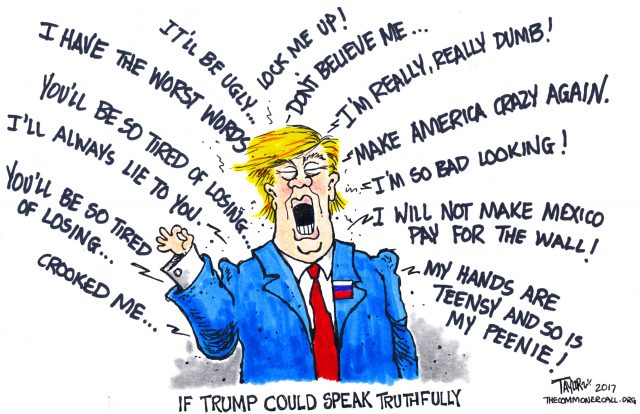
“The very concept of objective truth is fading out of the world. Lies will pass into history.” – George Orwell
By Reed Richardson
Fairness & Accuracy in Media (11/16/17)
It is a truism to say that everyone lies to someone. Since public officials entrusted with power in our democracy are no exception to this human trait—as historical research documents—it should be exceedingly acceptable to point out that all politicians, from your local city council right up to the White House, lie as well. The Framers afforded the press special constitutional protection in large part to ensure that such lies would not reach the public unchallenged.
Tragically, one of the most honest rhetorical tools that journalists have in the fight for truth has been struck from the lingua franca of US journalists. Within the stilted framework of mainstream news “objectivity,” the simple act of calling out “lies” or “lying” by a politician—especially a president—is now taboo. It imputes impossible-to-determine motives to those accused, the thinking goes, so the use of these words to identify a documented falsehood is now considered controversial, partisan, inflammatory, unfair.
Last fall, NPR editorial director Michael Oreskes constructed his own Orwellian logic to defend his news organization’s refusal to use “liar,” asserting that the word constitutes “an angry tone” of “editorializing” that “confirms opinions” (FAIR.org, 3/1/17). In January, Maggie Haberman, one of the New York Times’ preeminent political reporters, said much the same, claiming that her job was “showing when something untrue is said. Our job is not to say ‘lied.’”
Absurd lengths to avoid truth about lies
The absurd lengths to which corporate media will go to avoid calling presidential lies what they are has been readily apparent in the past month. After four US soldiers were killed in combat in Niger at the beginning of October—under still mysterious circumstances—Donald Trump and then his White House team issued a series of escalating and contradictory false claims to cover for their bumbling, belated response.
To its credit, the mainstream press did push back against Trump’s grossly untrue claims—at least initially. When Trump, in a Rose Garden press conference, boldly said he makes condolence calls to military next of kin unlike other presidents—namely, his predecessor—NBC News reporter Peter Alexander followed up and publicly disputed it with facts.
In any other walk of life, reasonable adults would recognize his statement as a pack of lies, spoken in a panic, with evident bad faith. But the closest that “straight news” journalism got to actually calling them “lies” was a New York Times headline (10/16/17) that stated, “Trump Falsely Claims Obama Didn’t Contact Families of Fallen Troops.”
This phrasing, “falsely claims”—or “falsely asserted”—has become corporate media’s default alternative to directly accusing the powerful of lying. But the journalistic instinct to vary a story’s language also works in favor of the powerful, allowing euphemisms for official lies to multiply throughout coverage. And rarely do these replacements do anything but weaken the indictment against the liar.
For example, the same Times story referenced above went from “falsely asserted” to a much more passive, even less forceful description just a few paragraphs later (all emphases added): “Mr. Trump’s assertion belied a long record of meetings Mr. Obama held with the families of killed service people.” As for the president’s embarrassingly obvious attempt at covering up his first lie with a bunch of others, the paper wrote: “Mr. Trump was pressed later in the news conference about his claim that Mr. Obama had never called bereaved families. This time, he seemed to soften his tone.”

Not in this dimension of the universe …
The Wall Street Journal’s take (10/16/17) on the real-time factchecking of the president’s condolence claims was similarly credulous: “Later in Monday’s news conference, when asked about his statement on the former presidents, Mr. Trump appeared to backpedal.” Yes, the Journal wasn’t even willing to report that Trump “backpedaled” without hedging. For its part, Politifact (10/17/17) called Trump’s claims “misleading,” but decided the issue was too fraught with caveats to render an official judgment as to whether they were true or false.
From there, Trump’s phony allegations escalated and his White House staff doubled- then tripled-down, attacking a war widow and a Democratic congressmember along with the press itself. As it did, the coverage began to wilt. Evidently afraid to be seen as taking sides in an increasingly public, partisan fight, our neutrality-minded media stopped trying to scrupulously adjudicate facts.
In a Fox News radio interview the next day (10/17/17), Trump claimed that he’d contacted “virtually everybody” who had lost a loved one in the military since taking office. It was a reckless lie, since his own White House military office didn’t have the necessary information to fulfill that task. In fact, only about halfof the families had been contacted. We know this because Roll Call (10/20/17) caught the White House dead to rights in an exclusive story. Nevertheless, that same story pulled its punches, right from the headline: “Pentagon Document Contradicts Trump’s Gold Star Claims: Email Undermines Veracity of President’s Statement About Gold Star Contacts.”
This inanimate-object-affects-president construction is no coincidence. It’s a staple of press coverage that wants to dance around White House lying without directly confronting it. (Contrast that with this clear, concise Vanity Fair—10/21/17—headline about the revelation, which zeroes in on those really responsible and their actions: “The White House Panicked After Trump Lied About Calling Soldiers’ Families.”)
After Trump’s bungled condolence call with the widow of Sgt. La David Johnson drew outrage from Florida Rep. Federica Wilson, the press’s syntactic contortions multiplied. CNN (10/19/17) got downright creative with its linguistic workarounds in one report:
“Trump’s reflexive boast that he was more attentive to the relatives of war dead than his predecessors Barack Obama and George W. Bush set off a cascade of consequences that has left his White House reeling…. The chain of events offers lessons in how a president walks a rhetorical tightropeevery time he speaks and underlines how Trump’s outspoken bluster and relish for confrontation that was so successful on the campaign trail threatens to undermine his hopes for a successful presidency.”
Trump laid down a clear marker for the press to check—both on Twitter and to TV reporters at a White House meeting—when he claimed that Wilson’s account of the call was “totally fabricated” and he “had proof.” He did not hedge, and offered no outs for the press to give him the benefit of the doubt under the banner of a misunderstanding or partial error. But when the mother of Sergeant Johnson, who was present for the call, and then Trump’s own proxies corroborated Wilson’s story, the press folded like a cheap suit.
Enter: Gen Kelly’s lies
To be fair, the press was partly distracted by White House chief of staff John Kelly’s entrance into the saga. After a credulous, fawning review of his defense of Trump, it turned out he too was pushing false claims against Representative Wilson. From the White House press podium, Kelly recounted a story about her 2015 speech at the opening of a new FBI facility in her district, clearly meant to highlight her supposed penchant for crass self-aggrandizement. But within a day, the Florida Sun-Sentinel (10/21/17) uncovered video evidence that unraveled Kelly’s story completely.
Another crutch corporate media use when they don’t want to weigh in on the truth is the attributed “lie”—as in a CNN story (10/20/17) that ran under the headline: “Rep. Frederica Wilson: Kelly Lied About FBI Ceremony.” It’s telling that the word “lie” is not allowed to stand on its own, as an informed assessment by the reporter or editor.
Soon the lies and the White House’s stubborn denials of them were piling up on top of one another so fast that establishment press coverage took on an almost weary tone. The Washington Post (10/20/17) inflicted this lazy, garbled phrasing on its readers to describe the White House:
“The ensuing debate has focused on attacks against Rep. Frederica S. Wilson (D) that have proved to be inaccurate but that the White House has refused to back away from, with the latest episode ensnaring Chief of Staff John F. Kelly…. Instead of backing down, White House press secretary Sarah Huckabee Sanders piled on Friday and said Kelly was justified in accusing the lawmaker of grandstanding, despite erring on the facts.”
Similarly, a New York Times news analysis (10/21/17) offered up an embarrassment of riches:
“By attacking Ms. Wilson, Mr. Kelly amplified the controversy. And by citing past events that turned out to be false, Mr. Kelly invited news media scrutiny and criticism even from his former military colleagues…. In another White House, a chief of staff might have followed up with an apology of his own, or at least an attempt to correct the record.”
The Associated Press (10/21/17) simply chalked Kelly’s claim up to a bad memory: “Video of the speech contradicted his recollection.”
Media failed Sgt. Johnson’s widow
What these stories all failed to do, though, was fully connect the dots between Trump’s and Kelly’s demonstrably false claims, on the one hand, and the White House’s stunning refusal to acknowledge or accept that as reality. When Trump or his White House proxies continue to stand by or repeat claims that facts have proven are simply not true, that establishes an intent to deceive—the very definition of lying—by anyone, president or no.
By the time Myeshia Johnson, Sergeant Johnson’s widow, went public, againconfirming Rep. Wilson’s account, the corporate media began treating the storyline much like any other political dispute, worthy of the full panoply of compromised, parsed phrasing. …
*****
Climate Without Borders: Meet A Meteorologist Who Dares To Say “Climate Change” In Weather Reports

(Editor’s Note: Minnesota Public Radio is to be congratulated for showing both courage and clarity by regularly reporting the weather within the context of accelerating climate change and always working to explain the huge difference between the daily and seasonal “weather” and “climate”.. – Mark L. Taylor)
Democracy Now! (11/17/17)
As Democracy Now! broadcasts from the U.N. climate summit in Bonn, we look at how climate-related hurricanes have devastated parts of the United States, but weather presenters still rarely utter the words “climate change.” We speak with Jill Peeters, a weather presenter in Belgium who is also the founder of Climate Without Borders.
Link to Story, Transcript and 13-Minute Video
(Commoner Call cartoon by Mark L. Taylor, 2017. Open source and free to use with link to www.thecommonercall.org )

